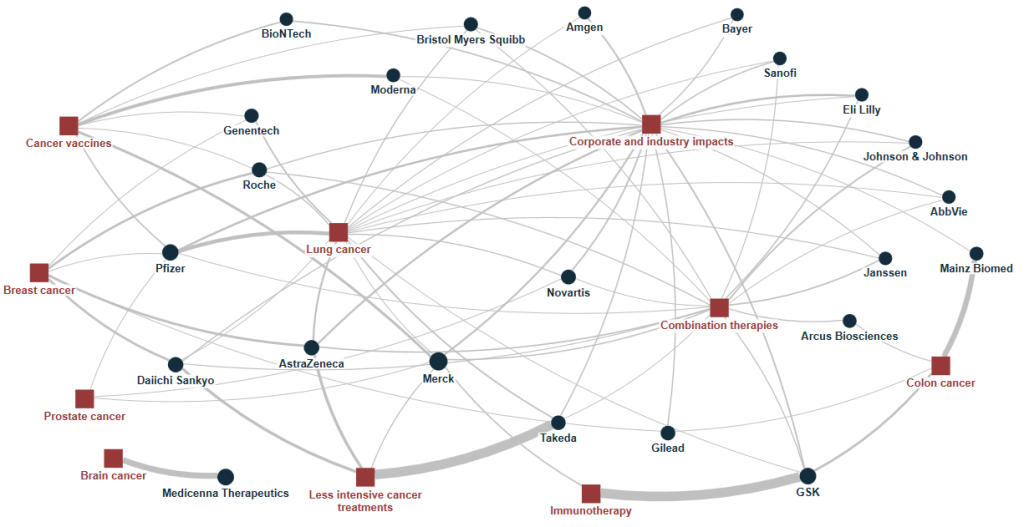ASCO’s focus on less invasive treatment suggests a narrative shift in oncology: that doing less — less surgery, less chemotherapy or less radiation — can help patients live longer and feel better.
The context: The 2024 edition of the American Society of Clinical Oncology (ASCO) Annual Meeting wasn’t one for the record books — the field of oncology didn’t transform, the earth didn’t move.
Which is not to say there wasn’t innovation that made media headlines.
Pfizer’s Lorbrena decreasing lung cancer progression by 81% compared to Xalkori, one of the seminal drugs in medicine, was one of the main ASCO stories. Another one was AstraZeneca’s Tagrisso decreasing progression in non-small cell lung cancer by 84%.
These stories, alongside Amgen’s Lumakras and Bristol Myers Squibb’s Krazati‘s new results for patients with non-small cell lung cancer, made Lung cancer one of the most prominent topics in the ASCO debate, as per our mapping analysis of 787 English-language articles in top-tier media outlets in the UK, US, and Canada, published in the last 30 days.
This is illustrated on the map below, which shows the links between the topics in the media debate (represented by squares) and the companies (represented by circles).

Our take
However, we think the most interesting PR and comms takeaway was the media focus on the topic of Less invasive cancer treatments.
This was spurred by a Takeda study that showed scaling back treatment for three kinds of cancer – ovarian, esophageal cancer and Hodgkin lymphoma – can make life easier for patients without compromising outcomes.
In this vein, an ASCO study that suggested the benefits of scaling back chemotherapy found that AstraZeneca and Daiichi Sankyo’s Enhertu extended the length of time patients with HER2-low breast cancer went without their tumours getting worse by about five months compared to those who got chemotherapy.
Meanwhile, a trial funded by Merck showed a “gamechanger” immunotherapy drug that “melts away” tumours and dramatically increases the chances of curing bowel cancer, replacing the need for surgery.
This new focus on less invasive cancer treatments has the potential to engender a narrative shift in oncology: that doing less — less surgery, less chemotherapy or less radiation — can help patients live longer and feel better.
This will be a very different point of view, as for a long time, cancer research has been about doing more, not less. In one sobering example, women with advanced breast cancer were pushed to the brink of death with massive doses of chemotherapy and bone marrow transplants. The approach didn’t work any better than chemotherapy and patients suffered.
Now, in a quest to optimise cancer care, a prominent ASCO narrative was: “How can patients feel better with less treatment?”
And this can very well become one of the core tenets in oncology PR and comms.
Discover more: ASCO 2024 Media Insights Report
Unlock the full analysis and gain deeper insights into the groundbreaking discussions and trends at ASCO 2024.
Take a look at our ENA analysis
Having read our opinions, below you can find an interactive Entity Network Analysis (ENA) of the media debate around ASCO 2024. This visualisation illustrates the relationships between the key phrases in the media discussions, highlighting how different concepts and entities are interconnected within the conversation.
By exploring this network, you can gain insights into the main topics, influential terms, and the overall structure of the media debate surrounding ASCO 2024. Zoom in with your mouse to enlarge the map and see the labels.
